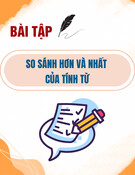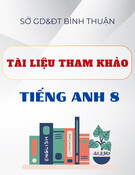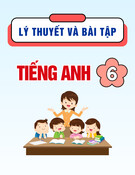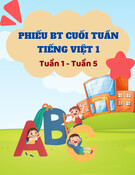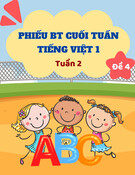
LUONG THE VINH LOWER SECONDARY SCHOOL
NAME: ………………………………………………… CLASS:…………
ĐỀ CƯƠNG ÔN TẬP GIỮA HỌC KỲ 2 NĂM HỌC: 2023-2024
MÔN: TIẾNG ANH 7
PART I : WRITING TEST
A. VOCABULARY: Review unit 7 unit 9
B. GRAMMAR
1. Verb tenses : The past simple tense. (Thì quá khứ đơn)
TO BE:
(+) S + was/were +……..
(-) S + was/were +not +……..
(?) Was/Were + S + ……..?
Yes, S + was/were.
No, S + wasn’t/weren’t.
TO VERB:
(+) S + V(2/ed) +……..
(-) S + didn’t + V(inf)+……..
(?) Did + S+ V(inf) +……..?
Yes, S + did.
No, S + didn’t.
Adverbs: yesterday, ago, last week/ month/ year,
in the past, in 2016,...
E.g: I was out last weekend.
Were you out last weekend?
Yes, I was.
E.g: They went out last weekend.
Did they go out last weekend?
Yes, they did.
2. Verb forms:
To V
V-ing
V
- Want
- Would like/ would prefer
- Don’t forget
- Remember
- Used
- Like, enjoy, love, prefer,
don't like, dislike, hate,
spend
- Prepositions (in, on, at,…)
- How about
- Will, would, can, could,
should, must + V
- Let’s + V
- Make/ let + O + V
3. Ask & answer about distance: hỏi và trả lời về khoảng cách:
Usage
“How far” là câu hỏi thường được dùng để hỏi về khoảng cách, quãng đường
giữa 2 địa điểm. Ta đặt “It” làm chủ ngữ trong câu để nói về khoảng cách.
Structure
How far is it from A to B?
It is (about) + khoảng cách
Example
How far is it from your house to Tan Son Nhat airport?
(Khoảng cách từ nhà bạn tới sân bay Tân Sơn Nhất bao xa?)
It’s about 200 km (Khoảng 200 km)
Note
Trong câu trả lời về khoảng cách ta thường dùng “about” (khoảng chừng) khi
không biết chính xác về khoảng cách đó.
4. (-ed and –ing) adjectives: Tính từ v-ing/ v-ed miêu tả phim và cảm xúc khi xem phim.
4.1. Cách thành lập tính từ V-ing/ V-ed
Cách thành lập tính
từ từ một động từ
Ví dụ
Thêm “-ed” vào sau
động từ để tạo ra
động từ miêu tả ai
đó cảm thấy như thế
nào, cảm xúc của
một người.
I’m interested in science-fiction films.
( Tôi rất thích thú với các bộ phim khoa học viễn tưởng)
I was so moved when I watched the end of the film.
(Tôi đã rất xúc động khi tôi xem đoạn cuối của bộ phim)
I was really surprised at the achievement at the Cannes Film Festival.
( Tôi đã rất ngạc nhiên với thành tích của họ tại Liên hoan
phim Cannes)
Thêm “-ing” vào
Last night, I saw an interesting science-fiction film.








